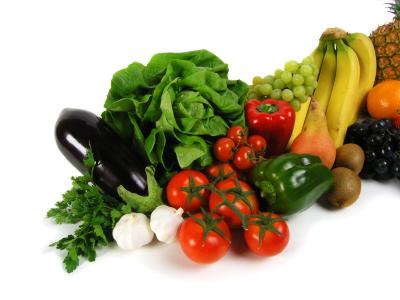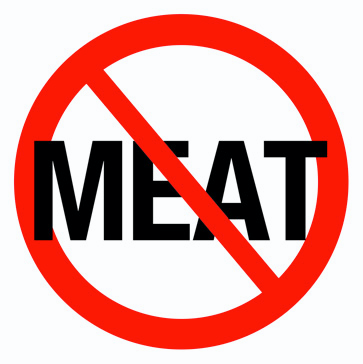
Typically, the traditional Mediterranean was not a land of vegetarians. But what if you aren’t particularly fond of meat, or eggs, or even dairy products?
Perhaps you are a vegetarian and don’t think the Mediterranean Diet Pyramid could be relevant for you. Please don’t read our recommendations for animal products as a requirement. You needn’t eat meat or eggs at all, especially if you are diligent about following the recommendations in the daily section of the Mediterranean Diet Pyramid. This level contains no meat or eggs. While a little animal meat or egg can go a long way, nutritionally speaking, and while fish certainly has demonstrated health benefits, none is a necessity in a healthy diet. Probably the question vegetarians hear the most is: “How do you get enough protein?” You may have even thought the same thing when surveying the Mediterranean Diet Pyramid.
Meat just once a week? How could that be enough? What about protein?
Actually, most Americans consume much more protein than their bodies need about 90 grams of protein each day, mostly from meat and processed meat. The average man typically needs only about 60 grams of protein per day, the average woman about 50 grams. Because saturated fat can be high in animal food sources, plant-based protein sources, although often less protein-dense, may be a healthier protein source. Getting enough protein takes little effort for the average adult (pregnant and breastfeeding women need slightly more). Breakfast alone can knock off a third or more of this requirement: 3⁄4 cup of oatmeal (dry) mixed with 11⁄2 cups of low-fat soy milk (to be cooked), then topped with 1⁄2 ounce of nuts and a cup of strawberries comes to about 25 grams of protein. Come lunchtime, a green salad with 1 tablespoon sunflower seeds and 1⁄2 cup garbanzo beans, 2 cups of hearty lentil soup, a whole-wheat roll, and a cup of nonfat plain yogurt mixed with fresh fruit comes to about 25 grams. For dinner, try 2 cups whole-wheat pasta topped with mushrooms, artichoke hearts, broccoli, green and red peppers, tomato sauce with Italian seasonings, 1⁄2 cup white beans, and 1 tablespoon of toasted walnut pieces; with a baked apple for dessert, the protein adds up to about 30 grams (or more, depending on the amount of vegetables cooked vegetables contain roughly 3 grams of protein per 1⁄2 cup). This meal rounds out the total to a more than satisfactory 80 grams of protein. And what do you know no meat or dairy! And that’s just one day! So you see, even if you choose not to eat meat despite the minor presence of meat in the traditional Mediterranean diet, you will still be consuming a heart-healthy, nutrient-dense diet. Of course, this book is specifically about the eating patterns of the traditional Mediterranean region, and these include a wide and fascinating variety of plant foods, as well as animal foods in small quantities sufficient to provide enough protein for the entire family, so vegetarians, please feel free simply to adapt the principles and recipes to your own taste. We won’t dispute that animal foods offer the most complete source of protein, meaning they include all the amino acids our bodies need. However, protein-rich plant foods in abundance and in a wide variety can do a great job of meeting our amino acid requirements as well. If you prefer to go completely without meat, eggs, and fish (a vegan diet), you could be at risk for a vitamin B12 deficiency. Without enough vitamin B12, you could develop a severe blood disorder called pernicious anemia. Vitamin B12 is found mostly in foods of animal origin, most notably in certain fish, such as clams, mackerel, tuna, and shrimp, as well as beef and lamb. Milk and dairy products also contain some vitamin B12, as well as certain fortified cereals (check the labels). Soy milk is a good source of B12. If you consume no foods of animal origin whatsoever, we recommend consultation with a dietitian or other qualified health care professional to ensure adequate vitamin B12 intake.
And that’s just one day! So you see, even if you choose not to eat meat despite the minor presence of meat in the traditional Mediterranean diet, you will still be consuming a heart-healthy, nutrient-dense diet. Of course, this book is specifically about the eating patterns of the traditional Mediterranean region, and these include a wide and fascinating variety of plant foods, as well as animal foods in small quantities sufficient to provide enough protein for the entire family, so vegetarians, please feel free simply to adapt the principles and recipes to your own taste. We won’t dispute that animal foods offer the most complete source of protein, meaning they include all the amino acids our bodies need. However, protein-rich plant foods in abundance and in a wide variety can do a great job of meeting our amino acid requirements as well. If you prefer to go completely without meat, eggs, and fish (a vegan diet), you could be at risk for a vitamin B12 deficiency. Without enough vitamin B12, you could develop a severe blood disorder called pernicious anemia. Vitamin B12 is found mostly in foods of animal origin, most notably in certain fish, such as clams, mackerel, tuna, and shrimp, as well as beef and lamb. Milk and dairy products also contain some vitamin B12, as well as certain fortified cereals (check the labels). Soy milk is a good source of B12. If you consume no foods of animal origin whatsoever, we recommend consultation with a dietitian or other qualified health care professional to ensure adequate vitamin B12 intake.
Strict vegetarians may also have difficulty getting enough vitamin B6 into their diets. The highest sources of this vitamin are certain fish such as bass and salmon. Certain plant foods are also rich in vitamin B6. If you don’t eat meat or fish, be sure to include in your weekly consumption those plant foods containing vitamin B6, such as chickpeas, whole grains, potatoes, bananas, avocados, and dried figs. Again, consultation with a registered dietitian or other qualified health professional would be beneficial. Minerals that could be deficient without the consumption of animal protein include zinc and iron. Meat, poultry, and fish are good sources of zinc, but so are whole grains and certain vegetables.
Iron is an essential mineral. Without it, people can develop an iron-deficiency anemia. People experiencing rapid growth stages children, teenagers, menstruating and pregnant women are especially in need of iron in their diets.
teenagers, menstruating and pregnant women are especially in need of iron in their diets.
Iron is an essential mineral. Without it, people can develop an iron-deficiency anemia. People experiencing rapid growth stages children, teenagers, menstruating and pregnant women are especially in need of iron in their diets. Iron comes in two forms: heme iron and nonheme iron. Heme iron is found only in animal meats and egg yolks. Nonheme iron is found primarily in plant foods such as whole grains, seeds, nuts, greens, legumes, and dried fruits. Nonheme iron is much less efficiently absorbed. However, the absorption of nonheme iron can be improved when combined with vitamin C or animal food sources containing heme iron. Although our body needs iron, consuming amounts far above the recommended daily allowance can be dangerous.
Some researchers believe that excessive iron intakes can lead to heart disease, or even cancer, especially in those who are not in need of a lot of iron, such as adult men. The heart disease/iron theory was fueled by results of a 1992 study involving more than two thousand adult males in Finland. The study showed that those men with the highest levels of iron in their blood were more than twice as likely to experience a heart attack as the men with lower levels. There has since been more recent research disputing this claim, but many experts still believe that iron fortification of foods such as bread products should be stopped because of the possible health risks for people who are not in need of large amounts of iron. For now, however, consuming animal meats in moderate amounts will help keep iron, especially the easily absorbable heme iron, at more reasonable levels. For more information on iron, contact your local registered dietitian or other health-care professional.
Vegetarian considerations aside, for those who choose to eat in a manner as close as possible to the traditional Mediterranean diet, foods of animal origin do help to ensure prevention of vitamin and mineral deficiencies. Of course, anyone with special nutrient needs, such as children, teenagers, pregnant women, and lactating women can benefit from the advice of a registered dietitian to assure they are meeting their unique nutritional requirements.
The key is to remember that the traditional Mediterranean diet remains staunchly plant-based, and the ratio of plant foods to animal foods appears to be conducive to good health and longevity. While many aspects of the traditional Mediterranean diet have been implicated in its apparent healthful quality, low animal product consumption may be a significant key to the health benefits of the traditional Mediterranean diet.
![]()
Disclaimer: This website is for information purposes only. By providing the information contained herein we are not diagnosing, treating, curing, mitigating, or preventing any type of disease or medical condition. Before beginning any type of natural, integrative or conventional treatment regime, it is advisible to seek the advice of a licensed healthcare professional.



























